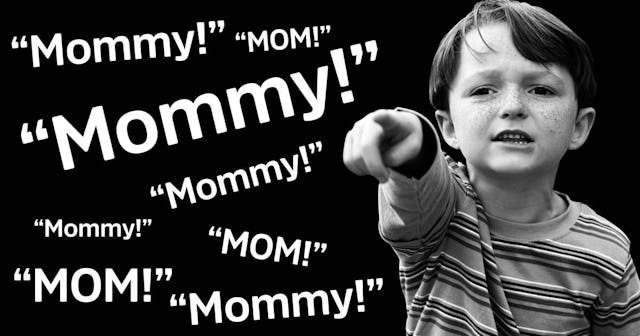When Your Kid Is A Rule-Following Tattle-Tale

“Mommy! That boy’s shoes are untied!” my son points to a playmate on the playground.
I look and see the little boy running, shoelaces flapping in the breeze. I shrug it off and figure my son will go back to playing. He doesn’t. His feet are firmly planted in the spot and he’s looking at me.
“You have to tell him to tie his shoes!” he says to me emphatically.
I ask my son if he’s tried to tell the kid about his shoelaces — his warning to the kid went ignored. Obviously this kid just doesn’t care about tying his shoes. I’m glad my kiddo is looking out for his peers, but I’m not going to get up and tell some kid I don’t know to tie their shoes. I assure him he’s done the right thing and send him on his way.
My son is absolutely a rule follower. He isn’t obnoxious about it, but he is very serious about it. He’s six, and it makes sense. He’s learning that actions have consequences, so of course he’s going to follow the rules. To him, if you don’t follow the rules, you will lose a privilege. Not following the rules is a very serious offense to him because he’s seen how it could end.
Having a kid who’s a rule follower can be pretty annoying sometimes. Not because they’re sticklers for rules. That can be a little hard to deal with, but you learn how to manage it. It’s when their moral compass and rule following goes out of their own little bubble. It’s one thing for them to follow the rules. But it’s much different when they’re trying to force other kids to follow the rules.
Being the parent of the strict rule follower is very interesting. We want our kids to do the right thing, and we want them to tell someone if another kid isn’t following the rules. However, there’s a fine line between keeping someone safe and just being a tattle-tale. That’s where the struggle comes in. How do we as parents encourage our kids to follow the rules, but not become insufferable tattle-tales?
Sergey Nazarov/Getty
Naturally, I encourage him to be a rule follower. Following the rules is sometimes a matter of life and death. The challenge comes from those rules that are kind of a moral gray area. You know, the rules that aren’t a huge deal but should be enforced sometimes? Those are the ones where having a kid who’s a rule follower gets worrisome. Because they have a strong moral compass, they cannot fathom someone not constantly being on their best behavior.
I wasn’t expecting him to be so horrified by a little kid not tying his shoes. Rather, I didn’t think it was something he’d bring to me to handle. He had told the kid his shoes were untied. Really, he had done everything he needed to do in that situation. I explained that to him. In this particular situation, all he could do was to tell the kid about the shoelace. Anything else was extra. Just because he felt that the kid wasn’t listening was no reason to get an adult involved.
When you have a rule follower for a kid, you have to teach them to know the difference between something important and something minor, the difference between things that are a matter of safety and stuff that’s simply a preference.
The hardest part is explaining to him that we can only be in charge of ourselves. They only understand that rules are made to be followed. So when they see someone not following those rules, they wrap their heads around it. You have to acknowledge that a person is breaking the rules. At the same time, you need to acknowledge that sometimes it’s not our place to discipline others.
Kids who are strict rule followers need you to meet them on their level. It’s easy to brush them off as dramatic or annoying. Sometimes that’s exactly what they are. But they’re also doing what we’re teaching them to do. If we give them a rule, we expect them to follow it. So they’re holding everyone to the standards we set for them. You can’t really be annoyed by that. I mean, you can, but why? Instead of admonishing them for it, we should be showing them how to not drive everyone bonkers.
I have to have this conversation with my son on a regular basis. He’s such a rule follower, he works himself into such a ball of stress fretting over someone else’s actions. I remind him that there is only one person’s actions he has control over — his. As long as he’s following the rules, whether it be at school or elsewhere, that’s all he needs to worry about. Sometimes we can’t control what other people do, even if we want to. I acknowledge his concerns and validate them, but remind him to keep his eyes on his own paper.
We also talk about when he does really need to tell an adult. If someone is in danger, then it’s absolutely necessary to get an adult involved. Hurtful words or actions are also something he can tell. Giving your rule-following kid boundaries for reporting other people’s misdeeds is helpful. This way, they still feel validated in their tattling, but they’re not making it difficult for everyone.
Raising a rule-following kid isn’t easy. The constant tattling on others can be exhausting. But we have to remember it’s coming from a genuine place. Getting them to understand when to tell and when to keep it to themselves takes time. Eventually they begin to understand the boundaries. The best thing we can do for our kiddos is to give them grace. They just want to live in an orderly world.
This article was originally published on